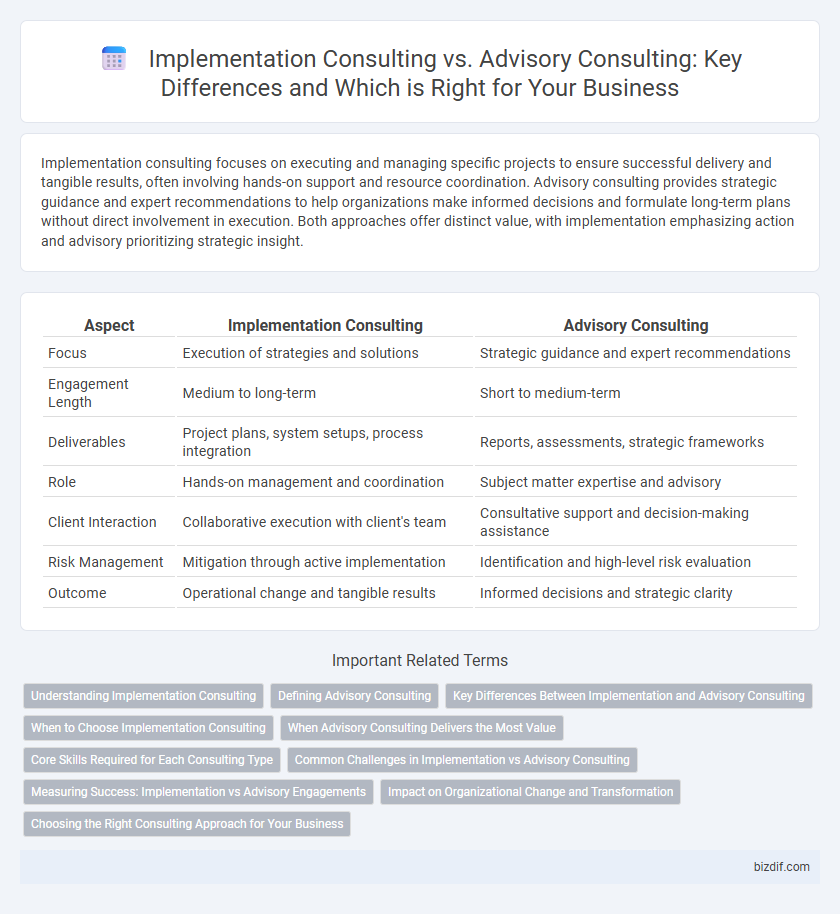Implementation consulting focuses on executing and managing specific projects to ensure successful delivery and tangible results, often involving hands-on support and resource coordination. Advisory consulting provides strategic guidance and expert recommendations to help organizations make informed decisions and formulate long-term plans without direct involvement in execution. Both approaches offer distinct value, with implementation emphasizing action and advisory prioritizing strategic insight.
Table of Comparison
| Aspect | Implementation Consulting | Advisory Consulting |
|---|---|---|
| Focus | Execution of strategies and solutions | Strategic guidance and expert recommendations |
| Engagement Length | Medium to long-term | Short to medium-term |
| Deliverables | Project plans, system setups, process integration | Reports, assessments, strategic frameworks |
| Role | Hands-on management and coordination | Subject matter expertise and advisory |
| Client Interaction | Collaborative execution with client's team | Consultative support and decision-making assistance |
| Risk Management | Mitigation through active implementation | Identification and high-level risk evaluation |
| Outcome | Operational change and tangible results | Informed decisions and strategic clarity |
Understanding Implementation Consulting
Implementation consulting focuses on executing strategic plans by managing resources, timelines, and processes to achieve specific business outcomes. It involves hands-on support in deploying technology systems, optimizing workflows, and ensuring change management aligns with organizational goals. This approach contrasts with advisory consulting, which centers on providing expert recommendations and strategic insights without direct involvement in execution.
Defining Advisory Consulting
Advisory consulting involves providing expert guidance and strategic recommendations to help organizations identify opportunities, solve complex problems, and enhance decision-making processes. Unlike implementation consulting, which focuses on executing specific projects or solutions, advisory consultants analyze market trends, assess risks, and offer insights to shape long-term business strategies. This type of consulting drives organizational transformation by aligning leadership goals with actionable intelligence and industry best practices.
Key Differences Between Implementation and Advisory Consulting
Implementation consulting focuses on the practical execution of strategies, ensuring that business plans are effectively translated into operational processes, systems, and changes within an organization. Advisory consulting centers on providing expert recommendations, strategic insights, and high-level guidance to help clients make informed decisions and plan future initiatives. Key differences include the hands-on involvement in implementation tasks versus the consultative role of advising without direct responsibility for execution.
When to Choose Implementation Consulting
Implementation consulting is ideal when organizations require hands-on support to execute strategies and achieve tangible results within a specific timeframe. It focuses on practical application, process optimization, and change management to ensure solutions are operationalized effectively. Choose implementation consulting when a business needs to translate advisory insights into actionable steps and measurable outcomes.
When Advisory Consulting Delivers the Most Value
Advisory consulting delivers the most value when organizations seek strategic guidance to navigate complex market dynamics and long-term growth opportunities. It excels in providing expert analysis, scenario planning, and risk assessment, enabling decision-makers to formulate effective business strategies. This consulting type is crucial during periods of transformational change, mergers, or entering new markets where informed judgment directly impacts organizational success.
Core Skills Required for Each Consulting Type
Implementation consulting demands strong project management, technical expertise, and problem-solving skills to execute strategies effectively within client organizations. Advisory consulting requires exceptional analytical abilities, strategic thinking, and communication skills to provide data-driven recommendations and influence decision-making. Both consulting types benefit from industry knowledge and client relationship management but differ in hands-on execution versus high-level guidance.
Common Challenges in Implementation vs Advisory Consulting
Implementation consulting often faces challenges such as resistance to change, integration with existing systems, and ensuring practical execution of strategies. Advisory consulting encounters difficulties in aligning recommendations with client expectations, managing ambiguity in strategic choices, and maintaining long-term stakeholder engagement. Both require effective communication, clear goal setting, and adaptability to evolving client needs.
Measuring Success: Implementation vs Advisory Engagements
Measuring success in implementation consulting centers on tangible outcomes such as project completion rates, adherence to timelines, and achievement of specific business objectives. Advisory consulting success is evaluated through the impact of strategic recommendations on long-term organizational growth, innovation, and decision-making effectiveness. Key performance indicators (KPIs) for implementation include cost savings and operational efficiency, whereas advisory KPIs emphasize client satisfaction and value realization.
Impact on Organizational Change and Transformation
Implementation consulting drives organizational change by actively managing project execution, integrating new processes, and ensuring adoption of technology or strategy shifts, resulting in measurable transformation outcomes. Advisory consulting focuses on diagnosing challenges, providing expert recommendations, and designing strategic roadmaps that guide decision-making and long-term change initiatives without direct involvement in execution. The impact on organizational change differentiates by consulting type, with implementation delivering tangible operational results while advisory shapes vision and strategy for sustained transformation.
Choosing the Right Consulting Approach for Your Business
Implementation consulting focuses on executing strategies and managing change within an organization, ensuring practical solutions are delivered effectively. Advisory consulting provides expert guidance and strategic recommendations without direct involvement in execution, allowing businesses to make informed decisions. Selecting the right approach depends on your company's needs for hands-on support versus strategic insight, balancing resources, timelines, and desired outcomes.
Implementation Consulting vs Advisory Consulting Infographic

 bizdif.com
bizdif.com